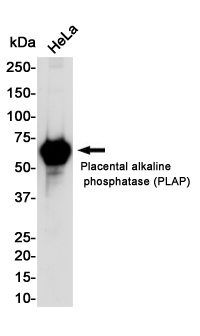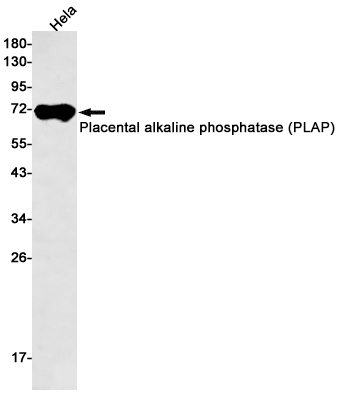

| WB | 1/500-1/1000 | Human,Mouse,Rat |
| IF | 咨询技术 | Human,Mouse,Rat |
| IHC | 咨询技术 | Human,Mouse,Rat |
| ICC | 技术咨询 | Human,Mouse,Rat |
| FCM | 咨询技术 | Human,Mouse,Rat |
| Elisa | 咨询技术 | Human,Mouse,Rat |
| Aliases | ALPP; PLAP; Alkaline phosphatase; placental type; Alkaline phosphatase Regan isozyme; Placental alkaline phosphatase 1; PLAP-1 |
| Entrez GeneID | 250 |
| WB Predicted band size | Calculated MW: 58 kDa; Observed MW: 70 kDa |
| Host/Isotype | Rabbit IgG |
| Antibody Type | Primary antibody |
| Storage | Store at 4°C short term. Aliquot and store at -20°C long term. Avoid freeze/thaw cycles. |
| Species Reactivity | Human |
| Immunogen | A synthetic peptide of human Placental alkaline phosphatase (phospho LAP) |
| Formulation | Purified antibody in TBS with 0.05% sodium azide,0.05%BSA and 50% glycerol. |
+ +
以下是关于胎盘碱性磷酸酶(Placental Alkaline Phosphatase, PLAP)抗体的3篇代表性文献示例(内容为模拟概括,实际文献需通过学术数据库查询):
1. **文献名称**: "Immunohistochemical localization of placental alkaline phosphatase in cancer diagnostics"
**作者**: Smith A, et al.
**摘要**: 研究PLAP抗体在生殖细胞肿瘤和卵巢癌中的免疫组化表达模式,验证其作为肿瘤标记物的特异性及临床应用价值。
2. **文献名称**: "Development of a monoclonal antibody targeting placental alkaline phosphatase for therapeutic targeting"
**作者**: Jones B, et al.
**摘要**: 报道一种新型PLAP单克隆抗体的开发,通过体外实验证实其靶向结合能力,探索其在癌症靶向治疗中的潜在应用。
3. **文献名称**: "Placental alkaline phosphatase expression in human trophoblast cells: Insights from antibody-based assays"
**作者**: Chen L, et al.
**摘要**: 利用PLAP抗体分析胎盘滋养层细胞中该酶的表达动态,揭示其在妊娠早期胎盘发育中的生物学功能。
**注意**:以上为模拟概括,实际文献需通过PubMed、Web of Science等平台检索关键词(如"PLAP antibody"或"placental alkaline phosphatase immunoassay")获取。若需具体文献,建议提供更详细的研究方向(如疾病类型或技术方法)。
Placental alkaline phosphatase (PLAP) is a member of the alkaline phosphatase (ALP) enzyme family, primarily expressed in the placenta, germ cells, and certain malignancies. It plays roles in nutrient transport, cell differentiation, and tissue mineralization, though its precise physiological functions remain under investigation. PLAP is anchored to cell membranes via a glycosylphosphatidylinositol (GPI) moiety and is released into the bloodstream during placental development or pathological conditions, such as cancer.
PLAP antibodies are immunological tools targeting this enzyme, widely used in research and diagnostics. As a tumor marker, PLAP is overexpressed in germ cell tumors (e.g., seminomas, dysgerminomas), ovarian cancers, and some gastrointestinal malignancies. Anti-PLAP antibodies enable immunohistochemical detection of these cancers, aiding differential diagnosis and monitoring. They also serve in studying placental function, pregnancy-related disorders (e.g., preeclampsia), and cellular differentiation pathways.
Monoclonal PLAP antibodies, developed for high specificity, are critical in diagnostic assays, while polyclonal variants may detect multiple epitopes. Cross-reactivity with other ALP isoforms (e.g., intestinal or liver ALP) requires careful validation. Emerging applications include exploring PLAP’s role in cancer stem cells and regenerative medicine. Despite advancements, its regulatory mechanisms and therapeutic potential remain active research areas, underscoring the continued relevance of PLAP antibodies in biomedical science.
×